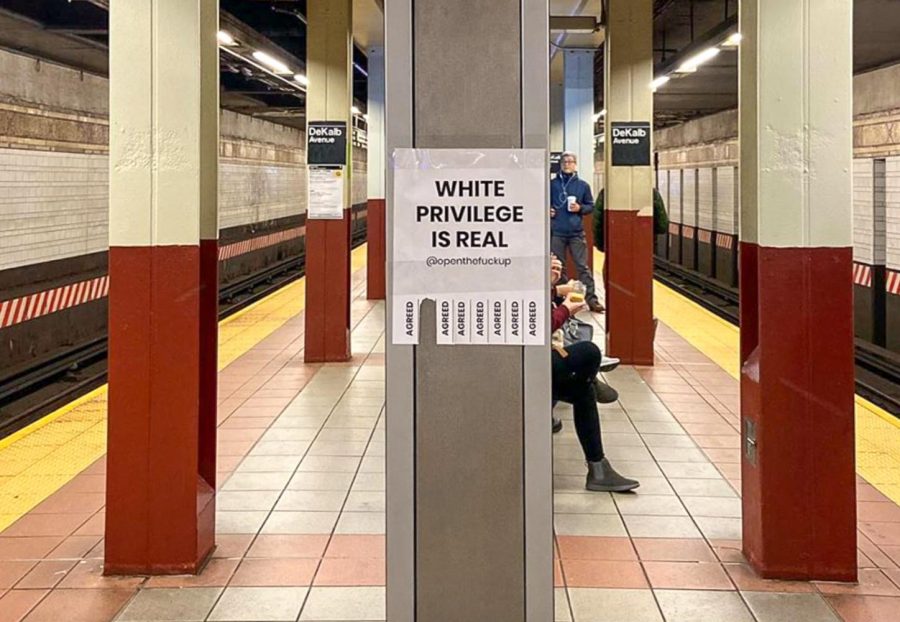If you’ve been around the city lately, you may have spotted a few flyers proclaiming to the world, “White Privilege Is Real” and “Insecure as F-ck.” From Washington Square to Times Square, the flyers were posted where they could get a reaction. And they did. The posters originally had slips attached to the bottom for people to tear off if they agreed with the statement. Some of the flyers are missing all of these slips.
“By you going up to a poster and ripping off a thing that means you’re part of our movement,” Steinhardt first-year and Open the F-ck Up co-creator Tori Husain said. “And then when people walk by and they see like five things ripped off they’re like, ‘Okay, other people agree with me.’”
This was the first social experiment by the month-old social media platform. You can find them on Instagram @openthefuckup, welcoming you with the cryptic bio, “Nobody talks about their insecurities.” At first glance, their account may look bare with only four posts, but as you delve deeper, you’ll discover an open invitation to converse candidly about America’s deepest social issues.
Their goal is exactly what the name implies: convincing viewers to share their genuine feelings and opinions by suspending labels, insults and judgments.
“I think what I personally wanted to change is how we have conversations now,” Husain said. “Every single human being is nuanced in every single way. And if we just cancel people, in my perspective, I think it’s lazy. We’re not actually having a conversation.”
“For me, it was a lot about like, ignorance and stuff, because I moved [to America] two or three years ago from Pakistan,” co-creator and Liberal Studies first-year Zoya Hasan said. “And I just see how ignorant people are here.”
It all began when Husain watched Chelsea Handler’s 2019 documentary, “Hello Privilege. It’s Me, Chelsea.”
“It really made me think like, ‘I wonder how other people would react to talking about white privilege,’” she said. “And then I put something on my Instagram story. And I was so interested in … how this would be if it was a public project.”
After grabbing attention with the white privilege project, the pair tackled insecurity. One of their Instagram posts challenged followers to “step out of your comfort zone, [and] put your insecurities in your bio.”
The result was staggering.
“So many people posted their insecurities on Instagram, and I think that’s a really big deal because a social media platform is where you show your most artificial, perfect selves,” Hasan said. “You don’t want people to see your flaws. And people posting their insecurities on there, like people we don’t even know? I thought that was so amazing. I knew maybe a few young people here and there were gonna see it and put it on their story, but I didn’t think it was gonna blow up.”
“In three weeks, we have 1300 followers,” Husain added.
Perhaps the most impressive part is Open the F-ck Up’s nationwide, and even international, support.
“We have people posting in Amsterdam, Toronto, the UK,” said Husain.”Not to mention Paris, North Carolina, New Hampshire, Philadelphia and Rutgers.”
However, the project still has a presence on campus.
“I do not know who started it or where it started,” said CAS sophomore Ma’Laja Patton. “But I actually found out about it through a friend of mine. I saw that she posted it on her story, like her insecurities tagged in her bio. And I was like, ‘Oh, wow, that’s really cool.’ So I followed them.”
Patton thinks the project has the potential to gain more attention at NYU.
“Everyone lowkey wants to be able to express that stuff, but no one’s ever really given, like, a very clear opportunity,” she said. “It’s kind of easier to say your insecurities with this because you can just fall back on like, ‘Oh, well they said to do it.’ I really like the idea of people being vulnerable with each other.”
But despite its many fans, the movement has also received plenty of backlash.
Though most people approach these posters to take a tab, others are taking the entire poster down. “A guy ripped it down and was like, ‘This is America,’” Husain said.
But it’s full steam ahead for the platform. The creators are planning two events in Brooklyn this spring, and they’re producing a video on masculinity. The pair hopes to explore a wide variety of themes.
“Basically anything that’s considered taboo, we just want to get on there and talk about,” said Hasan.
For now, though, the best thing you can do is follow the group’s Instagram account, DM the pair to get involved and most importantly, open up a conversation with those around you.
A version of this article appears in the Monday, March 2, 2020 print edition. Email Sabrina Choudhary at [email protected].






















































































































































